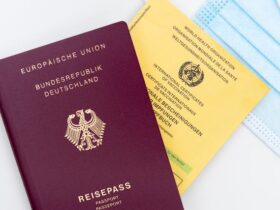“Herzlich Wilkommen” – this is a word you will see so many times after arriving in Germany. It means “warm welcome”. You are about to begin an exciting journey. Trust us, it will be an exciting journey indeed. At a point, you may feel overwhelmed especially if you don’t know anybody in Germany when you arrive in the country.
Before you can start your new life in Germany, there are a couple of things you are expected to do by law. It will be difficult to figure these things out when you don’t have anyone guiding you. Fortunately, it is your lucky day as you have chosen to come to TheGermanyLife blog to learn more. Today, you will learn about the first things you need to do after arriving in Germany. Keep on reading to learn more.

Top 7 First Things You Should Do Immediately After Arriving in Germany
1. Register Your Address (Anmeldung)
Everybody in Germany is required to register their address when they move to a new city. Yes, Germans do it too. The registration is free in most states. In fact, a city such as Leipzig will pay you €150 for moving to the city. In some cities such as Hamburg, you may be asked to pay €12 for the registration.
The registration is normally done in a location known as “Bürgeramt. Every city has many “Bürgeramt”. You need to find the one closest to you. In most cases, you are required to book an appointment on the website. This way, you don’t have to wait too long when you show up at the office. To register your address at a “Bürgeramt”, you will need:
- Anmeldeformular (Download it from the “Bürgeramt” website.
- Your Passport
- Your rental contract from your landlord (Mietvertrag)
2. Get a Health Insurance (Krankenversicherung)
Health insurance is mandatory in Germany. Everyone is required to have one. In Germany, there are two types of health insurance. The first one is called Public health insurance. It is available for anyone earning less than €59.400/year. This type of insurance is also available to students. Under public health insurance, the government pays part of your insurance every month. It provides comprehensive coverage. The most popular public health insurance companies in Germany include AOK, TK, DAK, and Barmer GEK.
The other type of insurance is private health insurance. Depending on your insurer, it can be expensive or very cheap. Cheap insurance usually does not provide comprehensive coverage like public ones. Additionally, you may be required to cover half of your treatment when you have this type of insurance.
3. Enroll At Your University and Get Your Enrolment Certificate (Einschreibebescheinigung)
Every school has a deadline for enrolment. Make sure you meet up with the deadline to enroll at your university and get your enrolment certificate. If you miss this deadline, there is nothing you can do about it and it can affect your stay in Germany. Some of the documents you need for enrolment include:
- Passport
- Visa (for non-EU)
- Admission Letter
- Proof of Language Proficiency
- Health Insurance
- Previous degree certificate
- Proof of semester payment
Note: Go through your admission letter, your university may mention the documents you need for enrolment.
4. Open Your Bank Account (Bankkonto)
If you are a foreign student or come to Germany with a blocked account, you will need to open a German bank account to be able to unblock your money. Besides, you need a German bank account to be able to work in Germany. You must do it as soon as possible. Some of the top banks in Germany include Sparkasse, Deutsche Bank, Commerzbank, Postbank, Volksbank, and N26.
I will recommend the N26. It is by far the most popular bank for students and foreigners in Germany. You can open this bank account from the comfort of your home. They are efficient and allow you to control your finance with their mobile app. Use this link below to open your N26 account and get 15 euro welcome bonus.
5. Get a German SIM Card for your Smartphone (handyvertrag)
You probably need a German SIM Card if you want to make calls. Top German networks include Vodafone, O2, and Telecom. However, their contracts can be very expensive. Look for networks that are not popular such as WinSim or Lyca. They provide affordable mobile SIM contracts.
6. Put Your Name on Your Mailbox
Germany has a thing for papers. You will receive tons of paper works via regular mail during your stay in Germany. Once you settle in Germany, make sure that your mailbox in your building has your name tag. This way, it makes it easier for postman and couriers to deliver your letters.
7. Make an Appointment for Your Resident Permit (aufenthaltserlaubnis)
Your visa allows you to enter Germany. However, if you are here to study, work, or live, your visa isn’t enough. Most visas have 3 or 6 months of validity. Besides, you cannot get work when you don’t have a resident permit and work permit.
After arriving in Germany. Make sure you visit the website for foreigners in your city and make an appointment for your resident permit. The authority in charge of this in Germany is known as “Ausländerbehörde”. Nowadays, you can make your appointment online. Make sure you take note of the documents to submit. Usually, these documents include:
- Passport
- School enrolment certificate
- Admission letter
- Block account details
- €100















After looking into a few of the blog articles on your web page, I honestly appreciate your way of writing a blog. I saved it to my bookmark site list and will be checking back in the near future. Please visit my website as well and tell me your opinion. Starr Vincent Abbot
I enjoy reading through an article that will make men and women think. Also, many thanks for allowing me to comment. Emmey Kean Eleonora